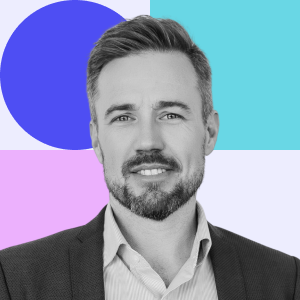Last time, I told you about our workation experience with CitizenM, five people working from our Ljubljana office for a week. If you missed it, feel free to check it out here.
Quick recap: We invited five CitizenM employees to work from our HQ for a week to see whether a change in environment boosts productivity and collaboration. The results? More tasks completed, stronger teamwork, and higher energy across the board. “Experience flexibility” isn’t just a nice idea since we have seen that it delivers measurable results. We have the full report right here if you want to dig into the details (you’ll see how there’s a $4 ROI for every $1 spent on wellbeing).
But this shift toward flexibility didn’t start with CitizenM. It started earlier, (and more radically) with one person, six months, and a 7-hour time difference.
We let Mark, one of our growth managers, do a workation from Asia for six months.
A real-world flexibility test
We didn’t just say yes to a travel request. We saw an opportunity: What if we could make international workations a reliable, scalable part of our flexibility model?
We're already a hybrid company. Remote work isn’t new for us. But Asia meant navigating a 6- to 7-hour time difference. We didn’t want to just support one of our team members. We wanted to pressure-test how far flexibility can stretch while maintaining (or even improving) performance.

Mark was the right person to check out this experience. He had a proven track record: self-managed, proactive, communicative, and consistently delivering results. The kind of person you trust to take on an edge-case experience.
But trust alone doesn’t run a business.
So we treated this like a project. We mapped his responsibilities, set delivery timelines, and clarified workflows. We planned for edge cases, VPNs, connectivity, etc. With the structure in place, we gave the green light.
And what actually happened??
Mark shifted his workday to match our timezone in Europe, 8 am to 4 pm, which translates to afternoons and evenings in Asia. That left his mornings free for everything from exploring local food markets to beach runs and museums.
In the afternoons, it was work as usual. He set up in co-working spaces across multiple countries, bringing back perspectives and ideas we wouldn’t have encountered from our office.
The results?
- Project deadlines? Met.
- Communication? Smooth.
- Work quality? Unchanged.
- Energy and engagement on video calls? Higher than usual.
In fact, his experience echoed what we later documented in the CitizenM experience:
- 80% of participants said they worked more efficiently and prioritized tasks better.
- The same number returned feeling more energized, satisfied, and connected to their teams.
Why this matters for us… and maybe for you
Essentially, this was a strategic investment in learning. What we got back was a playbook for distributed performance: how to set expectations, support employees across time zones, and maintain accountability without micromanagement.
It also clarified that flexibility isn’t about location, it’s about ownership. When people feel trusted and empowered, they deliver. Mark didn’t disappear into a hammock with a laptop. He showed up, stayed on track, and brought new energy to the team.
Remote didn’t make him less committed; it made him more invested.
What it taught me as a founder
The truth is, Mark’s performance wasn’t the surprising part. What surprised me was how much I had to grow to make this work.
As a founder, I’m wired to stay close to everything - timelines, projects, people. Letting someone work six time zones away, without daily check-ins, forced me to let go of control but not of support.
And that’s the leadership skill flexible work demands: creating the right conditions, then trusting your team to deliver. Not passively hoping but actively enabling.
So my takeaway? This wasn’t about Mark proving himself. It was about us proving that with the right systems and mindset, performance doesn’t need proximity.

Thinking about your own team?
Not everyone wants to work from another continent. Most prefer stability and familiarity. But for the right people in the right life moments, this kind of flexibility can be transformative, for them and for your company.
If you’re considering it, start small. Create a structure. Test before scaling. And document everything.
Next time, I’ll share what both experiences taught us about making flexibility scalable without breaking your culture or your processes.
But if you’re already thinking, “How could this work for my team?”, we built something to help you explore that.
You can get the workation experience report here.
About the author
Luka Birsa is the co-founder of Joan Workplace, a platform designed to simplify meeting room booking, desk reservations, visitor management, and workplace signage.
Joan started as a meeting room management system but has quickly evolved into an entire suite of productivity-enhancing tools. From desk booking and visitor management to streamlining team collaboration, Joan is designed to help modern workplaces thrive.
.jpg?width=4000&height=2000&name=ISE_2024_PeterG_presenting_Joan-6-RE_16x9_thumbnail%20(13).jpg)
About the author
Luka Birsa is the co-founder of Joan Workplace, a platform designed to simplify meeting room booking, desk reservations, parking and asset booking, visitor management, and workplace digital signage.
Joan started as a meeting room management system but has quickly evolved into an entire suite of productivity-enhancing tools. From desk booking and visitor management to streamlining team collaboration, Joan is designed to help modern workplaces thrive.
Insights that keep your office running smoothly
Fresh content on productivity, space management, and the future of work. Perfect for managers, admins, and busy teams.
Join thousands of workplace professionals who already read the Joan blog. Unsubscribe anytime.

